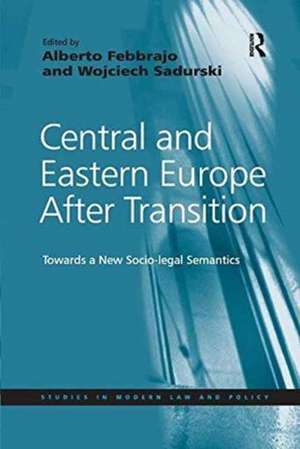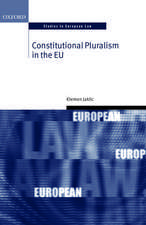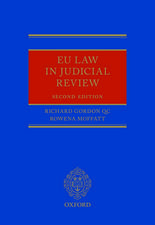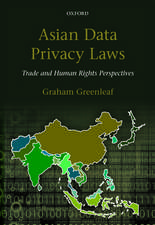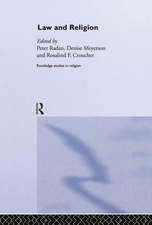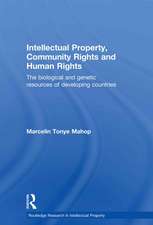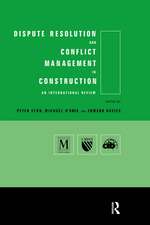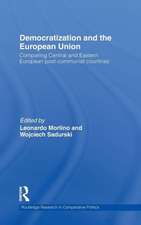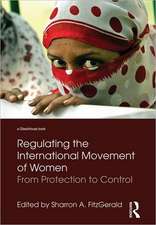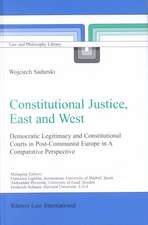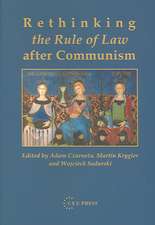Central and Eastern Europe After Transition: Towards a New Socio-legal Semantics
Autor Wojciech Sadurski Editat de Alberto Febbrajoen Limba Engleză Paperback – 23 noi 2016
| Toate formatele și edițiile | Preț | Express |
|---|---|---|
| Paperback (1) | 469.34 lei 43-57 zile | |
| Taylor & Francis – 23 noi 2016 | 469.34 lei 43-57 zile | |
| Hardback (1) | 1054.71 lei 43-57 zile | |
| Taylor & Francis – 28 aug 2010 | 1054.71 lei 43-57 zile |
Preț: 469.34 lei
Nou
Puncte Express: 704
Preț estimativ în valută:
89.81€ • 94.00$ • 74.75£
89.81€ • 94.00$ • 74.75£
Carte tipărită la comandă
Livrare economică 31 martie-14 aprilie
Preluare comenzi: 021 569.72.76
Specificații
ISBN-13: 9781138260702
ISBN-10: 1138260703
Pagini: 376
Dimensiuni: 156 x 234 x 29 mm
Greutate: 0.45 kg
Ediția:1
Editura: Taylor & Francis
Colecția Routledge
Locul publicării:Oxford, United Kingdom
ISBN-10: 1138260703
Pagini: 376
Dimensiuni: 156 x 234 x 29 mm
Greutate: 0.45 kg
Ediția:1
Editura: Taylor & Francis
Colecția Routledge
Locul publicării:Oxford, United Kingdom
Notă biografică
Alberto Febbrajo is Professor of Law at the University of Macerata, Italy, and a former Rector of the university. Wojciech Sadurski is Professor of Law at the University of Sydney, and former Dean of the Law dept, European University Institute, Florence, Italy.
Recenzii
'What are the striking features that may shape the future legal regimes of Central and Eastern Europe? Twenty years after the collapse of communism, with the end of the transitional process, the new Member States have taken a path leading towards new socio-legal semantics. This book, by carrying out a thorough investigation of the constitutional arena, provides a wide topical and territorial account of new legal and political cultures shaping the region of former soviet dominance. Its interdisciplinary nature and politico-legal bibliography are both important features and will be valuable to readers.' Csaba Varga, Pazmany Peter Catholic University, Hungary
Cuprins
Introduction; Part 1 The Constitutional Framework; Chapter 1 Constituting the Heterarchy of European Constitutionalism in the EU’s New Member States, Ji?íP?ibá?; Chapter 2 Legal Cultures in Transition, AlbertoFebbrajo; Chapter 3 Democratic Ethics, Constitutional Dimensions and ‘Constitutionalisms’, PaulBlokker; Chapter 4 Constitutional Courts and Constitutional Culture in Central and Eastern European Countries, WojciechSadurski; Chapter 5 Constitutional Culture and the Theory of Adjudication, DanielSmilov; Chapter 6 Settling Accounts with the Past, the Conceptualization of Difference and the Dilemmas of the Law-governed State, Gra?ynaSk?pska; Part 2 The Legal Professions; Chapter 7 The Democratization and Modernization of Post-communist Judiciaries, Zden?kKühn; Chapter 8 Bureaucratic and Managerial Cultures in Central Eastern European Courts, DanielaPiana; Chapter 9 Polish Prosecutors, Political Corruption, and Legal Culture, PaulinaPolak, DavidNelken; Chapter 10 Notaries in Central Europe, GiselaShaw; Chapter 11 Multiple Transitions to the EU Constitutional Project, VittorioOlgiati;
Descriere
How have national identities changed, developed and reacted in the wake of transition from communism to democracy in Central and Eastern Europe? This book defines and examines new autonomous differences adopted at the state and the supranational level in the post-transitional phase of the post-Communist area, and considers their impact on constitutions, democracy and legal culture.
